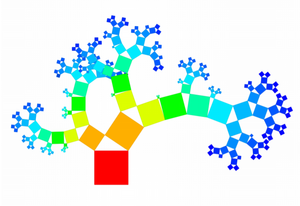The Research Group is Moving!
During winter term 2021/22, we move to University of Bamberg. From Oct. 15, 2021, Fabian Beck holds a full professor position on Information Visualization.
New webpage of the research group: https://www.uni-bamberg.de/vis
Publications
Publications of the research group since 2016. For earlier publications, please visit Fabian Beck's Google Scholar or DBLP profile.

Type of Publication: Article in Collected Edition
Generalized Pythagoras Trees: A Fractal Approach to Hierarchy Visualization
- Author(s):
- Beck, Fabian; Burch, Michael; Munz, Tanja; Di Silvestro, Lorenzo; Weiskopf, Daniel
- Editor:
- Battiato, Sebastiano; Coquillart, Sabine; Pettré, Julien; Laramee, Robert S.; Kerren, Andreas; Braz, José
- Title of Anthology:
- Computer Vision, Imaging and Computer Graphics - Theory and Applications, VISIGRAPP 2014, Revised Selected Papers
- pages:
- 115-135
- Publisher:
- Springer
- Publication Date:
- 2016
- Digital Object Identifier (DOI):
- doi:10.1007/978-3-319-25117-2_8
- Fulltext:
- Generalized Pythagoras Trees: A Fractal Approach to Hierarchy Visualization (5.52 MB)
- Citation:
- Download BibTeX
Abstract
Through their recursive definition, many fractals have an inherent hierarchical structure. An example are binary branching Pythagoras Trees. By stopping the recursion in certain branches, a binary hierarchy can be encoded and visualized. But this binary encoding is an obstacle for representing general hierarchical data such as file systems or phylogenetic trees, which usually branch into more than two subhierarchies. We hence extend Pythagoras Trees to arbitrarily branching trees by adapting the geometry of the original fractal approach. Each vertex in the hierarchy is visualized as a rectangle sized according to a metric. We analyze several visual parameters such as length, width, order, and color of the nodes against the use of different metrics. Interactions help to zoom, browse, and filter the hierarchy. The usefulness of our technique is illustrated by two case studies visualizing directory structures and a large phylogenetic tree. We compare our approach with existing tree diagrams and discuss questions of geometry, perception, readability, and aesthetics.
